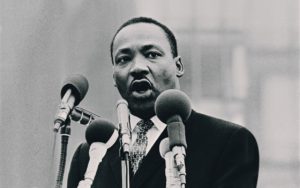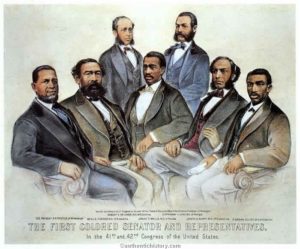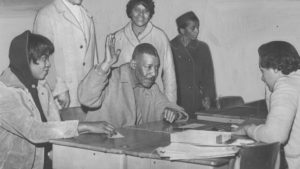A view by Patrick J. Sims, Deputy Vice Chancellor for Diversity & Inclusion

Every January we celebrate the legacy of the Rev. Dr. Martin Luther King, Jr., and his peaceful quest for civil rights in a country that was not living up to our Founders’ declaration of self-evident truths; that all Americans are created equally.
King was an American patriot who worked to heal our country’s inner divide; a division that was a threat to the very existence of democracy by design. Government for and by the people is at the center of the American governance trilogy of democracy, civil rights and voting. Without it, our society can fall into disarray based on the harsh reality that “freedom has never been free.” This is even more important when the elements that undergird our notion of freedom, such as our democracy, come under attack. We must all beg the question, asking ourselves “what must I do to protect these freedoms?”

Democracy is designed to give equal voice to all of our citizenry no matter their religion, gender or creed. This premise is brilliantly balanced by the First Amendment right to free speech, a critical tool to participating in governance through democratic debate. The right to discuss and disagree is designed to culminate with voting in the democratic process. To close the loop, majority rule on our common interests — and by default our civil rights — is why democracy is coveted by countries around the world.
The right to vote for who will represent your interests in government is not only the core of democracy, it sustains civil society, dare I say our freedom. Voting impacts our quality of life and reflects social change through public policy from desegregation and equitable public education to employment and interpretation of the law. If we don’t vote, others will decide your destiny.

That’s why every vote counts. History documents the power of the ballot, and sadly, the battle to deny its use. In the years immediately following emancipation, African American voters put 16 African Americans in the U.S. Congress, while more than 600 more were elected to state legislatures and hundreds more held local offices across the South. Just think – many of these votes were cast with an “X” by former slaves who had been forbidden to read or write. For the first time in their lives they were free to choose who would represent their interests.
In 1866, the first civil rights act granted equal rights under the law to all people within the jurisdiction of the United States to protect the newly emancipated class of former slaves. Two years later, the 14th Amendment enshrined the 1866 Act’s principles in the Constitution. Congress ratified the 15th Amendment forbidding states from denying the right to vote on grounds of “race, color, or previous condition of servitude” in 1870.

Fast forward nearly 100 years later, Dr. King stood next to President Lyndon Johnson when he signed the Voting Rights Act of 1965, outlawing state and local legal barriers that prevented African Americans from exercising their right to vote. A hundred and one years had passed, and once again, our coveted democratic institution prevailed against denial and violation of constitutional rights with the passing of the Civil Rights Acts of 1964.
The Civil Rights movement set America on a trajectory we’ve yet to fully realize, and our ability to get there has always been clear. Every vote counts every time, and the stakes are rising with every election for local school board or council, state office and federal leader. Failing to vote, by choice or default, is not an option.
I pray that 100 years from now history will tell a different story; one that reflects the struggle. where we are no longer are too busy or disconnected to understand the cost of our freedom and democracy. Perhaps one of the most effective way to celebrate King’s birthday, Black History Month, or any observance of progress in our history is to register and pledge to vote. Do it on behalf of the elders from the past and the children to come.